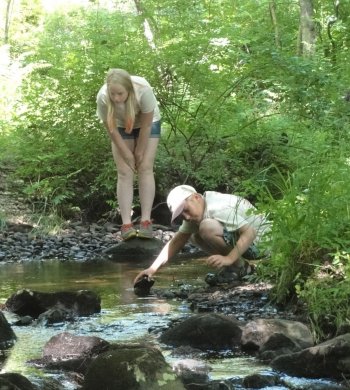Unlike most of us at the Insider, Frank and Wendy Harrison had a plan for their retirement.
The Concord school teachers wanted to open a science center at their home in Chichester, but like most plans, things changed. Instead of waiting for their careers as science educators to come to an end, the Harrisons decided to get things going a little earlier. Maybe we could buy that island and just start weekending there until our writing days are over. It’s kind of the same idea.
So this summer they opened the N.H. Science Camp at their solar powered 5-acre home that abuts 100 acres of explorable land. It’s something of a scientific paradise that’s just made to teach young minds about all nature has to offer.
And they still have two weeks left to get in on the action. From Aug. 11 to 15, the junior scientists will take a closer look at predators of New Hampshire, while the week of Aug. 18 to 22 will focus on reptiles. In addition to the Monday through Friday day camp for students entering 6th, 7th and 8th grades, the Harrisons also hosted two weeks of high school students who needed to make up a science class.
“The science camp is an alternative way to get those credits,” Frank Harrison said.
Frank has taught science at Concord High since 1992 and Wendy teaches fifth grade at Broken Ground School with a science expertise.
The camps are eight hours a day and have a mixture of classroom learning, field explorations, as well as a bit of fun. Okay, it’s actually a ton of fun, like the kind of fun you’re having reading this story.
“It’s new for us so it’s a learning curve,” Harrison said. “So far, the plan has gone well and we’re getting great feedback.”
The Harrisons built an addition on to their home that now houses the newly opened science center, but it’s the land surrounding their home that makes it so absolutely awesome for experimentation. With vernal pools, grassy clearings and a mossy stream nearby, it’s the way nature was intended to be. At least when it comes to learning about it.
“It’s not a sit-down camp,” Harrison said.“We’re able to do 40 hours of intense experimental learning.”
The days are jam packed with cool things like trail walks, tracking and trapping, habitat exploration and design and build take home projects. And we didn’t even mention the first hour after lunch/movie time is dedicated to archery. Nothing like slinging a few arrows around on a full belly to make an afternoon of science even better.
“You’ve got to change it up, so the kids can focus on the learning and then take a break from it,” Harrison said.
When the budding science enthusiasts do catch something like a garter snake, water spider, butterfly and/or frog, they take the temporary pets back to one of the six aquarium tanks at the science center addition for observation. There’s also ferrets, rabbits and a painted turtle on site, as well as horses owned by the Harrison’s neighbors. And at the end of the week, after all the information is gathered, they release the little critters back to the wild for the next group to find.
“We go out and catch a couple of garter snakes, feed them and check them out,” Harrison said. “We also teach the kids on preparing a proper habitat. They really learn the culture of how to work with animals.”
They even learned how to fish by using just a stick and string – and of course a hook and bobber.
There’s time spent in the garden as well, even though it can be a tough sell at first.
“Kids initially find plants boring. They don’t move, the don’t bite, but they’re equally important,” Harrison said.
For more about the camp or to register for the final two weeks, visit nhsciencecamp.com.









